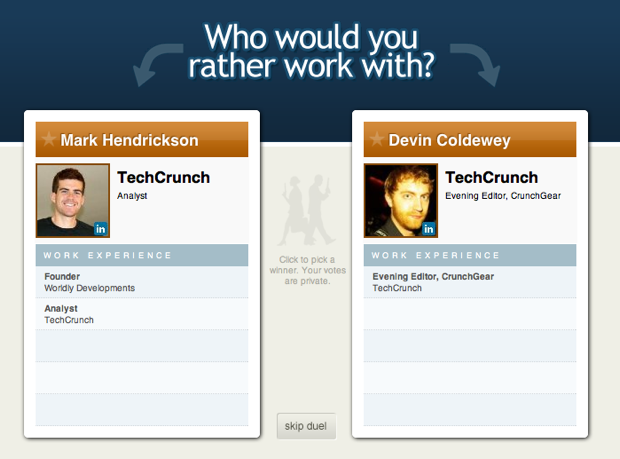
People sure do love judging their coworkers. And now it’s easier and more addictive than ever.
Meet Cubeduel, a site that launched two days ago and is quickly making the rounds on Twitter. After landing on the site, you’ll be asked to connect with LinkedIn via OAuth. Next, you’ll be presented with photos of two of your former or current coworkers, prompting you to choose who you’d prefer to work with. Click one, and the site will show you another pair. Then another. Vote 20 times and you unlock access to see how other people have ranked you. Yeah, you’re already hooked.
But that’s not all. The site records the votes (which are all anonymous) and tallies them, allowing you to browse individual companies like Google or TechCrunch, to see which employees have won the most ‘duels’ based on votes aggregated from all users. In other words, it gives you a nice, easy to read ranking of the ‘best’ people in each company (more on that later).
The site is the brainchild of Adam Doppelt (cofounder of UrbanSpoon) and Tony Wright (cofounder of RescueTime), both of whom have left the startups they helped found to work on other projects, including this one. Wright says that CubeDuel came together over the course of the last two weeks. Since launching yesterday “thousands” of people have signed up (the site still has pretty poor analytics tools) and over 50,000 votes have been submitted in the last day.
While the site certainly falls somewhere on the evil spectrum, it’s not as bad as Honestly.com, which lets users write anonymous reviews about their peers. Sure, you might end up ranked in the last 10% of your company on Cubeduel, but since there are no comments you don’t have to potentially deal with coworkers insinuating that you’re corrupt or devious.
It’s fun and feels slightly mischievous, but it also has some flaws. One of these involves the fact that you’re compelled to choose between one person or the other, even if you don’t know one of them very well (yes, there’s a ‘skip’ button, but it feels like a cop-out and the site doesn’t go out of its way to say you should only vote for people you’ve actually worked with). As I tested the site I found myself favoring people with whom I’d worked directly, even if I couldn’t really say whether they were a better worker than the other.
There’s also the charm factor at work — if you knew everyone at your last company (and most people liked you), then you’re probably going to fare better than the guy who churns out great code in a quiet corner of the office. Then again, as Wright says, the charm factor is always at work in the workplace anyway.
So why is the site spreading so quickly? Aside from appealing to the darker side of human nature (which is more viral, naturally), Cubeduel prompts you repeatedly to share the site with your friends on Facebook, LinkedIn, and Twitter (part of this is because you need at least four votes before the site will show you your own ranking).
It’s too early to tell if this is just a fad. If it does have some legs, Wright says that the site could figure out some ways to monetize it by packaging data in much the same way that Glassdoor does (he says the site could also let people rank companies they’ve worked at).